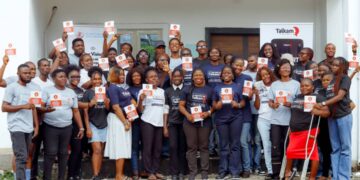By Asuquo Cletus
A Non-Governmental Organization, Devatop Centre for Africa Development, through the support of intercultural development hub, has conducted a two-day capacity-building workshop in Calabar aimed at equipping 50 frontline advocates with promotional materials and skills, to report human rights abuses using the Talkam App a digital platform developed to facilitate real-time, evidence-based reporting.
The training brought together 50 participants from civil society organizations, grassroots communities, and youth groups across Cross River State, all of whom were trained as Talkam Advocates community members empowered to document and report various forms of abuse, especially those affecting women, children, and other vulnerable groups.
According to the organizers, the initiative is part of Devatop’s broader strategy to expand digital human rights monitoring and promote accountability by closing the gap between survivors and access to justice.
Speaking during the opening session, Funola Ojo, Acting Executive Director of the Bridge Leadership Foundation, represented by Rosemonde Archibong the Program Manager of The bridge Leadership Foundation represented emphasized the growing need to integrate technology into human rights advocacy efforts.
“This training is part of Devatop’s commitment to promoting social justice and protecting vulnerable populations,” she said. “The Talkam App empowers citizens to report abuse ranging from domestic violence and sexual exploitation to human trafficking and police brutality in real time, with the option to upload evidence and track their cases.”
She noted that the Talkam initiative responds to persistent gaps in traditional reporting systems, which are often inaccessible to victims in remote or underserved areas.
Victoria Ukong, the Cross River State Coordinator for the Network Against Trafficking, Abuse, and Labour, described the training as a “game-changer” for community-level advocacy.
“For too long, survivors have been silent because they lacked a safe and accessible way to speak out,” Ukong said. “Through this training, we are equipping participants to not only report violations but also act as advocates for justice in their local communities.”
She explained that participants were taught how to ethically document incidents of abuse, collect facts, protect survivor identities, and avoid re-traumatization. They also learned how to respond appropriately, refer victims to support services, and navigate the legal frameworks that protect human rights.
Kebe Ikpi, a digital media strategist and human rights advocate, urged participants to amplify their work through responsible use of social media.
“Social media has the power to shape narratives and pressure authorities to act,” he said. “We must use these platforms not just to raise awareness, but to hold institutions accountable. A single post, tweet, or video can trigger a broader demand for justice.”
Ikpi also highlighted the importance of digital safety, including how to share content ethically, protect identities, and tag the relevant authorities when reporting abuses online.
Jennifer Ikweueze, Communications Lead at Devatop, emphasized that the Talkam App was developed through extensive consultations with experts in human rights, technology, and law enforcement. She said the current focus is on scaling up usage through trained advocates.
“This app is not just a tech solution; it is part of a movement,” she said. “We are working to ensure no case of abuse goes unnoticed or unreported. With this training, communities are now empowered to speak up, act, and advocate for change.”
Participants described the training as eye-opening, timely, and highly practical. Many expressed readiness to begin their roles as digital human rights monitors within their communities.












